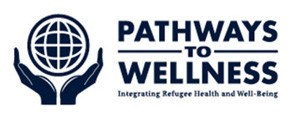 The Pathways to Wellness: Integrating Refugee Health and Well-being project field-tested an evidenced-based mental health screener that is easily used in healthcare settings. The Refugee Health Screener-15 (RHS-15) was designed to be short (15 questions) with neutral language that does not directly address violence, torture, or trauma. The RHS-15 was empirically developed to be a valid, efficient and effective screener for common mental disorders in refugees. The RHS-15 has been integrated into standard physical health screenings for newly arrived refugees in many states across the United States and has been used internationally supporting asylum seekers.
The Pathways to Wellness: Integrating Refugee Health and Well-being project field-tested an evidenced-based mental health screener that is easily used in healthcare settings. The Refugee Health Screener-15 (RHS-15) was designed to be short (15 questions) with neutral language that does not directly address violence, torture, or trauma. The RHS-15 was empirically developed to be a valid, efficient and effective screener for common mental disorders in refugees. The RHS-15 has been integrated into standard physical health screenings for newly arrived refugees in many states across the United States and has been used internationally supporting asylum seekers.
CEO and President of WSI, Dr. Michael Hollifield led the evaluation efforts with the Pathways team- Beth Farmer, Junko Yamazaki, Tsegaba Woldehaimanot, Sasha Verbillis-Kolp and Annette Holland. Together they developed publications and other materials on how to effectively use the RHS-15 and situate it within cross-cultural healthcare, refugee resettlement and humanitarian settings. The team is grateful to all the refugee community members who participated in the project.
Currently the RHS-15 is available in 20 languages:
- Amharic
- Arabic
- Burmese
- Cuban Spanish
- Farsi
- French
- Haitian Creole
- Karen
- Kinyarwandian
- Nepali
- Mexican Spanish
- Russian
- Somali
- Cuban Spanish
- Mexican Spanish
- Kiswahili
- Tigrinya
- Dari
- Pashto
- Ukrainian
The RHS-15 was developed by the Pathways to Wellness: Integrating Refugee Health and Well-being © partners, a project of: Lutheran Community Services Northwest, Asian Counseling and Referral Services, Public Health Seattle & King County, and Michael Hollifield, M.D. Generously funded by the Robert Wood Johnson Foundation, The Bill and Melinda Gates Foundation, United Way of King County, The Medina Foundation, M.J. Murdock Charitable Trust, Seattle Foundation, and the Boeing Employees Community Fund.
In addition to the RHS-15, Pathways developed a comprehensive model which included refugee community outreach and an 8-week cultural adjustment support group curriculum. Through provider education, Pathways lead capacity trainings to enhance service providers responsiveness in serving refugees, and increase access to psychosocial support. These pillars, anchored the holistic model of care that including screening, community outreach, and education.
